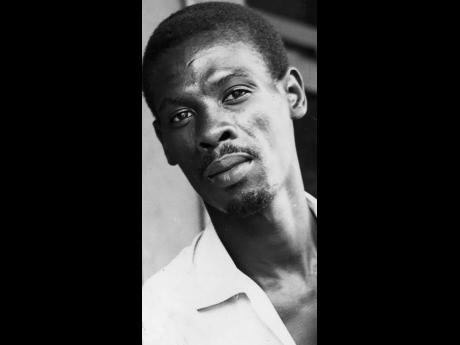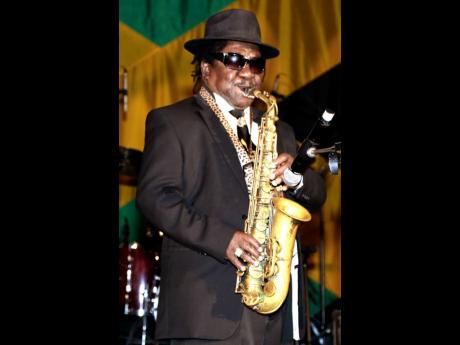Herbie Miller | Lester “Ska” Sterling ascends to celestial realm
Protean alto saxophonist and trumpeter Lester “Ska” Sterling’s effect on the development of Jamaican popular music has been profound. Not only has he performed on uncountable recording sessions and live engagements, but his influence on horn players is beyond speculation. Unfortunately, Lester Sterling died at 87 on Tuesday, May 16, at his home in Florida. He was the only living instrumentalist from the seminal band the Skatalites. Doreen Schaffer, the band’s vocalist, is now a lone survivor.
On learning of Lester’s passing, Everald Wray, a leading musician on the current scene, posted: “Thanks Maestro, for being a part of a group of great men who started a genre of music that is now the grandfather of all the genres that come after in Jahmekya. Without you, I wouldn’t have a music career to see the world free of cost. We don’t take your contribution for granted and will never forget.” Dean Frazer considers him a “very unique alto player, whose beautiful sound and phrasing was just different from any other. It worked perfectly with our music, mainly ska.”
A sibling of a musical family, Lester, like his elder brothers, the reed specialist Gladstone and trumpeter Roy, went to the Alpha Boys’ School. His half-brother, Keith Sterling, is an accomplished pianist and keyboard player. At Alpha, Lester encountered future musical innovators Rico Rodriques, Don Drummond, and Johnny Moore, and he simultaneously sharpened his musical skill as a trumpeter and saxophonist.
After leaving school, Sterling joined the Jamaica Military Band in the early 1950s and played Coney Island jobs before stinting with dance bands, including Luther Williams and Val Bennet’s on trumpet. In addition to The Skatalites, Sterling was featured in the studio and live bands of Clue J. and the Blues Blasters, Drumbago All Stars, Prince Buster All Stars, Byron Lee and The Dragonaires, and Tommy McCook and the Supersonics, into the late 1960s. It is a period during which he worked for producers Clement Dodd, Duke Reid, Randy’s, and Prince Buster. He also backed and soloed on tracks with early vocals such as Derrick Morgan, Prince Buster, Jimmy Cliff, Laurel Aitken, Lascelles Perkins, Delroy Wilson, and The Wailers.
CELEBRATED FRONTLINE
As a charter member of the renowned Skatalites, Sterling was part of the band’s celebrated front line. For many music lovers, they were local music’s horn section par excellence. Fans were excited by experiencing the combined rhythmic weight and the sheer melodic fluidity and punctuations of its primary soloists, trombonist Don Drummond and the trumpeter Johnny More, the two tenor titans Roland Alphonso and Tommy McCook, along with Sterling, locking horns and blowing ferociously in competition, challenging each other like formidable gladiators engaged in a battle royal in Ancient Rome.
In these good-natured but fierce encounters, usually, an intense competition between the two tenors, Alphonso and McCook, the visible and aural idiosyncratic disposition of Don Drummond’s and Moore’s alluring solos, Sterling’s contribution was never insignificant. His capacity to excite as a soloist was always coherent and thoroughly engaging. Despite the competition, Lester told interviewer Peter Clemm: “We were friends in a sense, Dizzy, Tommy, Roland, and Don, but it was competition at the same time. Everybody wanted to outdo each other ... . It is good, though.”
On his recording of Victor Herbert’s Indian Summer, Lester effortlessly glides on the melody with the fluency, graceful flow, and optimism of the heartwarming image of a Waved Albatross floating through the air. Meanwhile, he achieved a significant hit with Moma No Want No Bangarang, a 1968 collaboration with Stranger Cole for producer Bunny “Striker” Lee that contrasts the refinement of Indian Summer. Under Sterling’s mastership, this 1953 Latin jazz number titled Bongo Chant by the British saxophonist Kenny Graham engaged more of a rootsy jump. So instead of copying the original, it was arranged with a native personality, achieved with Cole repeating the title, while Sterling indulges in a series of calls and responses accentuated by extended measures of improvised sequences that seize the imagination of reggae fans.
However, Sterling’s most engaging moment was in a duet encounter with Roland Alphonso on the perennially appealing Lee Harvey Oswald. This Skatalites recording provides an opportunity to explore the contrast in approach between the master tenor saxophonist’s brilliantly conceived solo and Sterling’s melodic fluency and rhythmic pulse in musical conversation to realise one of ska’s most exciting pieces of recorded brilliance and an instant classic. For many who witnessed the Skatalites live, these are adorable musical moments and treasured memories.
LOVED PLAYING JAZZ
Lester loved playing jazz while warming up for a performance and lamented being unable to routinely demonstrate his passion for Charlie “Yardbird” Parker. Sometimes we arranged small private sessions for a few close friends who shared that devotion whenever he occasionally visited Jamaica. On one occasion at the late Buddy Pouyatt’s Saturday morning backyard get-together, after reminiscing about the musical environment of times past, Lester reeled off a series of Bird’s solos, much to the amazement and delight of the old-timers. At other times, we would trade bebop phrases whenever we visited to see who would be the first to lapse into repetitious statements.
In 1988, Lester Sterling was awarded the Order of Distinction for his contribution to popularising ska and reggae music. His industry recognition includes the 1996 Grammy nomination for best album Hi-Bop Ska! The 30th Anniversary Recording. And when the music industry was rewarded for its achievements since the island’s independence at the Jamaica 50 Chancellor’s Award on December 8, 2012, at the University of Technology, appropriately, as its elder statesman, Lester received the award on behalf of the industry, adding to the other commendations he individually and collectively received.
With his transition, we mortals are left with a considerable amount of music to entertain and enlighten us as we reflect on the greatness we had witnessed and been part of when inventive musicians like Lester “Ska” Sterling trod among us. He now joins his fellow innovators and instrumentalists in the sacred ranks of the Immortal Skatalites in the celestial realm.
Herbie Miller is a cultural historian specialising in slave culture, Caribbean identity, and socio-musicology. Send feedback to herbimill.hm@gmail.com.


